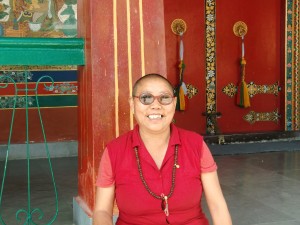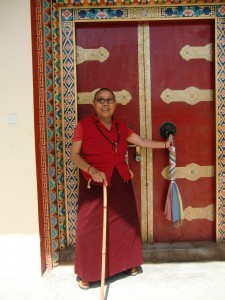Four years ago, Dolma became a nun. She did 100,000 prostrations in the temple, 100,000 mandala offerings and 100,000 prayers. Then she went to Tso Pema (Rewalsar) to ask her spiritual leader for permission to change her life. He agreed and gave her the red chupa, which she has worn since that day. Her hair was cut and she offered all her jewelry to the temple of Guru Rinpoche. Like her father, she joined the Nyingma sect at the end of her life, trying to purify any negativities and practicing dharma.
Dolma reached McLeod Ganj at the age of eleven. Back in Tibet, her family were living as nomads in the Khampa region when one day the Chinese disturbed the silence. “I don`t know why, but suddenly these Chinese people came. They had guns, many Tibetans were killed and even more were separated from their families”, Dolma remembers. She fled with her parents and her younger brother over the Himalayas. Her mother died on the way at the Nepalese border. Dolma`s two elder brothers, already married at that time, were left behind – one got killed by the Chinese, the other one still lives in Tibet.
While her younger brother attended Tibetan Childrens Village school, Dolma started to knot carpets to feed herself and her father, who became a monk but continued to live with his daughter. At the age of eighteen, Dolma married a Tibetian man who, like her, had been born in the Khampa region. She gave birth to two children, a son and a daughter. “In these times, McLeod Ganj was such a lovely place”, Dolma says with regret in her voice. “Not so many taxis and tourists, today it`s so busy!”
When Dolma was 23, her father died, and two years later her husband also passed away, from cancer. Dolma herself worked hard making carpets until her health became poor. “In the place where all the women were making carpets, there was so much bad energy: gossip, jealousy and even fights. I felt as though I had collected too much non-virtue, so I finally decided to become a nun and practice dharma as well as I can.”
With her bad knees, Dolma cannot live in a nunnery and fulfill all the duties a nun has there. So she rents a house near to the Library of Tibetan Works and Archives where she attends two Buddhist philosophy classes each day. Sometimes, her elder brother calls her from Tibet. He is now is working for the Chinese government. “I am not happy about him working for the Chinese, but of course he has to survive. He has eight children to feed”, Dolma explains. Two years ago, he was able to send her 40,000 Rupees for her knee operation.
“I hope His Holiness the Dalai Lama is right when he says that Tibet will be free soon”, Dolma says, “although I am not sure what soon is meaning in this context. But I feel old now, who knows if I will still be alive tomorrow? I try to make the best of it here”.






 Print
Print Email
Email













